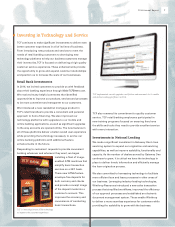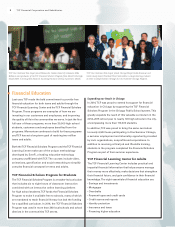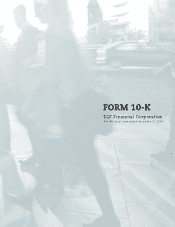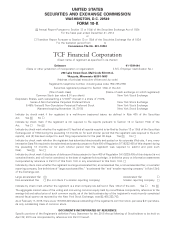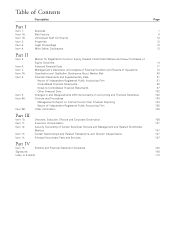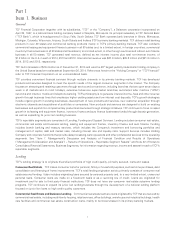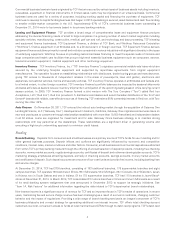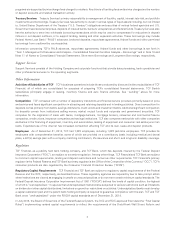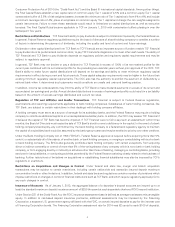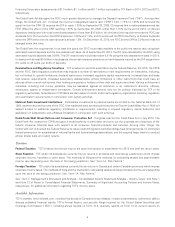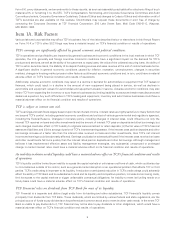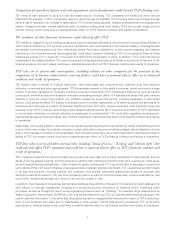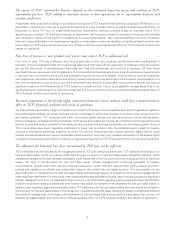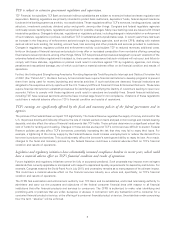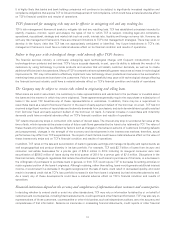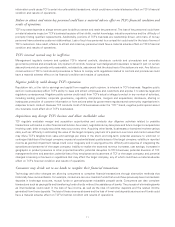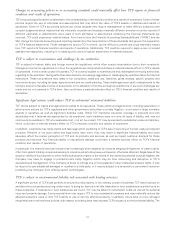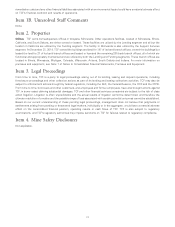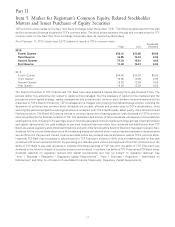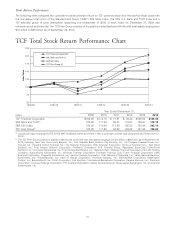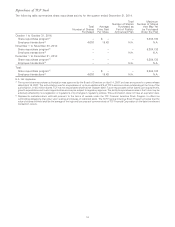TCF Bank 2014 Annual Report Download - page 19
Download and view the complete annual report
Please find page 19 of the 2014 TCF Bank annual report below. You can navigate through the pages in the report by either clicking on the pages listed below, or by using the keyword search tool below to find specific information within the annual report.Form 8-K, proxy statements, and amendments to those reports, as soon as reasonably practicable after electronic filing of such
material with, or furnishing it to, the SEC. TCF’s Compensation, Nominating, and Corporate Governance Committee and Audit
Committee charters, Corporate Governance Guidelines, Codes of Ethics and changes to Codes of Ethics and information on all of
TCF’s securities are also available on this website. Stockholders may request these documents in print free of charge by
contacting the Corporate Secretary at TCF Financial Corporation, 200 Lake Street East, Mail Code EX0-01-G, Wayzata,
MN 55391-1693.
Item 1A. Risk Factors
Various risks and uncertainties may affect TCF’s business. Any of the risks described below or elsewhere in this Annual Report
on Form 10-K or TCF’s other SEC filings may have a material impact on TCF’s financial condition or results of operations.
TCF’s earnings are significantly affected by general economic and political conditions.
TCF’s operations and profitability are impacted by general business and economic conditions in the local markets in which TCF
operates, the U.S. generally and foreign countries. Economic conditions have a significant impact on the demand for TCF’s
products and services, as well as the ability of its customers to repay loans, the value of the collateral securing loans, the ability of
TCF to sell or securitize loans, the stability of its deposit funding sources and sales revenue at the end of contractual lease terms.
A significant decline in general economic conditions caused by inflation, recession, unemployment, changes in securities
markets, changes in housing market prices or other factors could impact economic conditions and, in turn, could have a material
adverse effect on TCF’s financial condition and results of operations.
Additionally, adverse economic conditions may result in a decline in demand for automobiles or equipment that TCF leases or
finances, which could result in a decline in the amount of new equipment being placed in service, as well as declines in
automobile and equipment values for automobiles and equipment already in service. Adverse economic conditions may also
hinder TCF from expanding the inventory or auto finance businesses by limiting its ability to attract and retain manufacturers and
dealers as expected. Any such difficulties in TCF’s leasing and equipment, inventory and auto finance businesses could have a
material adverse effect on its financial condition and results of operations.
TCF is subject to interest rate risk.
TCF’s earnings and cash flows largely depend upon its net interest income. Interest rates are highly sensitive to many factors that
are beyond TCF’s control, including general economic conditions and policies of various governmental and regulatory agencies,
including the Federal Reserve. Changes in monetary policy, including changes in interest rates, could influence not only the
interest TCF receives on loans and other investments and the amount of interest TCF pays on deposits and other borrowings, but
such changes could also affect: (i) TCF’s ability to originate loans and attract or retain deposits; (ii) the fair value of TCF’s financial
assets and liabilities; and (iii) the average duration of TCF’s interest-earning assets. If the interest rates paid on deposits and other
borrowings increase at a faster rate than the interest rates received on loans and other investments, then TCF’s net interest
income and earnings could be adversely affected. Earnings could also be adversely affected if the interest rates received on loans
and other investments fall more quickly than the interest rates paid on deposits and other borrowings. Although management
believes it has implemented effective asset and liability management strategies, any substantial, unexpected or prolonged
change in market interest rates could have a material adverse effect on its financial condition and results of operations.
An inability to obtain needed liquidity could have a material adverse effect on TCF’s financial condition and results
of operations.
TCF’s liquidity could be limited by an inability to access the capital markets or unforeseen outflows of cash, which could arise due
to circumstances outside of its control, such as a general market disruption or an operational problem that affects TCF or third
parties. TCF’s credit rating is important to its liquidity. A reduction or anticipated reduction in TCF’s credit ratings could adversely
affect the ability of TCF Bank and its subsidiaries to lend and its liquidity and competitive position, increase its borrowing costs,
limit its access to the capital markets or trigger unfavorable contractual obligations. An inability to meet its funding needs on a
timely basis could have a material adverse effect on TCF’s financial condition and results of operations.
TCF Financial relies on dividends from TCF Bank for most of its liquidity.
TCF Financial is a separate and distinct legal entity from its banking and other subsidiaries. TCF Financial’s liquidity comes
principally from dividends from TCF Bank. These dividends, which are limited by various federal and state regulations, are the
principal source of funds to pay dividends on its preferred and common stock and to meet its other cash needs. In the event TCF
Bank is unable to pay dividends to it, TCF Financial may not be able to pay dividends or other obligations, which would have a
material adverse effect on TCF’s financial condition and results of operations.
6


